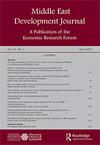On the potential and Limitations of monetary policy in Turkey*
IF 0.9
Q4 DEVELOPMENT STUDIES
引用次数: 4
Abstract
ABSTRACT The use of monetary policy to stimulate economic activity around the globe and in Turkey has been receiving a flurry of attention. Calls for lower interest rates have become louder as the country’s private driven growth has slowed down. However, monetary policy faces the challenges of maintaining external stability and reviving domestic conditions, which could necessitate conflicting interest rate policies. To determine which goals are most suitable for monetary policy, one must understand the effects of monetary policy and its transmission channels to the macro economy. Our empirical results suggest that monetary policy in Turkey has fairly limited power to affect output growth, even in the short-run. We find that external factors – such as shocks to risk aversion and global growth – have a much stronger impact on economic activity in Turkey. These results seem to be in line with the strand of the literature, which highlights the importance of global financial cycles and argues that exchange rate flexibility alone is not enough to guarantee monetary autonomy in a world of large capital flows. Consequently, our empirical findings corroborate the notion that monetary policy should focus on its overriding objective of price stability, given Turkey’s greater exposure to supply shocks and pro-cyclicality of international finance.论土耳其货币政策的潜力和局限性*
利用货币政策刺激全球和土耳其的经济活动一直受到广泛关注。随着该国私营部门驱动的增长放缓,要求降低利率的呼声越来越高。然而,货币政策面临着维护外部稳定和恢复国内状况的挑战,这可能需要相互冲突的利率政策。为了确定哪些目标最适合货币政策,人们必须了解货币政策的影响及其对宏观经济的传导渠道。我们的实证结果表明,即使在短期内,土耳其的货币政策对产出增长的影响也相当有限。我们发现,外部因素——如对风险厌恶的冲击和全球增长——对土耳其的经济活动有更大的影响。这些结果似乎与文献的观点一致,这些文献强调了全球金融周期的重要性,并认为,在一个大规模资本流动的世界里,单靠汇率灵活性不足以保证货币自主权。因此,我们的实证研究结果证实了这样一种观点,即考虑到土耳其更容易受到供应冲击和国际金融的顺周期性影响,货币政策应侧重于价格稳定这一压倒一切的目标。
本文章由计算机程序翻译,如有差异,请以英文原文为准。
求助全文
约1分钟内获得全文
求助全文

 求助内容:
求助内容: 应助结果提醒方式:
应助结果提醒方式:


